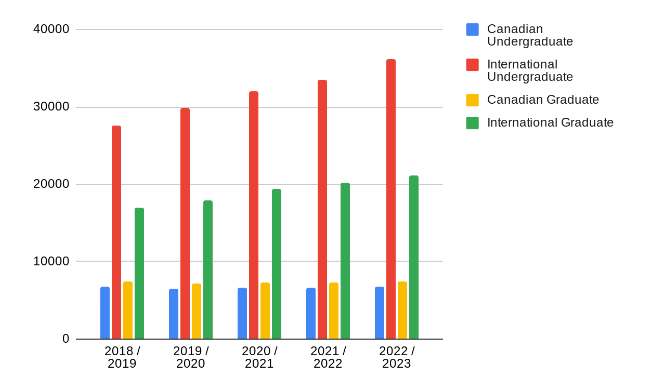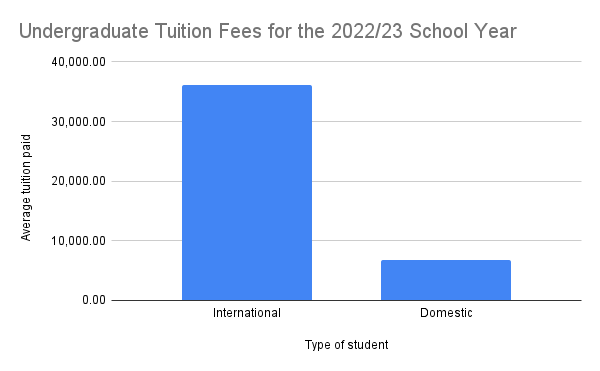Canadian universities and colleges raked in more than $9.6 billion in tuition from international students in a single year.
Despite making up just 17 per cent of students studying in Canada, international students contributed 43.5 per cent of all tuition fees collected in 2020, according to the most recent survey by Tuition and Living Accommodation Costs (TLAC). It reports 373,599 international students attended a university or degree-granting college in 2020/2021.
TLAC does not calculate the total amount international students pay in tuition across the country and it doesn’t keep record of this population by level of study. Statistics Canada, however, tallies fees spent by undergraduate or graduate study.
Based on the average cost of tuition for these students that year, domestic and foreign students spent a total estimated $22 billion.
“Tuition for international students is not subsidized here.”
Universities and colleges are collecting more from international students every year with increases in tuition, while prices for domestic or in-province students remain at a similar or fixed rate — regardless of government grants institutions receive of up to 80 per cent in some provinces.
“Lacking a cap on how much tuition can be raised, and less financial aid services than the Canadian students,” are among the most common complaints from international students, said Damanpreet Singh, international student representative for the Canadian Federation of Students.
The University of British Columbia, for example, increased tuition fees for international students for 2023/2024 by five per cent for new students, and three per cent for those returning for another year of study. UBC expects to collect $54 million more in tuition than it did last year.
The university also expects to be short $1 million in fees from domestic students.
Montreal’s McGill University is one of the only schools in Canada that has introduced a Guaranteed Tuition Model for new international students to establish fixed fees for each term, and “eliminate uncertainty around tuition costs,” according to the university’s latest budget. Still, tuition fees remain the second-biggest revenue stream for McGill.

A spokesperson for the Nova Scotia Community College (NSCC) explained in an email to New Canadian Media that federal and provincial taxes subsidize post-secondary schools to support domestic students.
“Tuition for international students is not subsidized here,” said the NSCC spokesperson. “International students have not contributed to provincial or federal taxation, which contributes to [subsidizing] tuition.”
In March, Ontario extended its tuition freeze for the upcoming year for residents from the province, which the University of Toronto estimates has cost the institution $195 million in revenue since 2019.
The university expects to make almost $3 million in 2023-2024, including in student tuition, and fees for international students will be increasing by 2.1 per cent.
NSCC has not had a tuition fee increase in the past two years, the college’s spokesperson said, and tuition only accounts for 15 per cent of its revenue. At the University of Toronto, it accounts for 88 per cent of revenue – a 20 per-cent jump from last year, despite the tuition freeze.
The university did not comment on questions from NCM about the potential pressure provincial funding has on fixing tuition fees.
Toronto’s George Brown College reported collecting more money in international student tuition fees ($164,845) than it did from government grants and subsidies ($141,946) in 2023/2024.
Ontario remains the most expensive province in Canada to study to attend post-secondary schools, where international students pay more than $40,000 a year for undergraduate studies in 2022-2023. The rest of the provinces, except B.C., charged under $30, 000 –according to Statistics Canada.
Increased pressure on international students to succeed in school
Samarjeet Singh, a former international student who graduated from Cape Breton University this May, has advice for others like him who come to Canada to study: don’t worry about permanent residency.
“The main thing that students should keep in mind when they’re planning to come to Canada is to think of a career — don’t think of residency,” said Samarjeet, who graduated from Cape Breton University this May and is now training to be a public health inspector in Manitoba. Chasing permanent resident (PR) status is what keeps international students from pursuing better job opportunities, he said.
“As long as I have a good job, and I can continue to get a permit to work, that’s good enough for me.”
New research involving 1,300 international students in B.C. reveals they are getting stuck in jobs outside their fields of study and that post-secondary institutions put more emphasis on recruiting students than ensuring their success.
On top of paying more than five times what domestic students spend on tuition, international students face increased pressure to excel at their university or college.

“If you fail in three subjects, you will be thrown out of the college,” said Jaspreet Singh, an international student at Conestoga College in Ontario and vice-president of the Sikh Student Association there.
Jaspreet said he knows international students aren’t getting enough food or sleep because their time is spent studying or working. He wants schools to prioritize international students’ mental wellbeing, and employment success.
Although he says he can’t deny the value of his education, he recognizes that studying in Canada isn’t easy.
Despite these difficulties “we are optimistic about the future”, said Jaspreet, “so that gives us strength.”
Keitlyn (they/them) is a multi-media journalist residing in Scarborough, Ont. They are interested in long-form journalism that highlights the visibility of BIPOC expression. True to millennial form, they are a small business owner, carpenter and freelance photographer. They were interested in NCM as it understands the "big picture." Journalists are dedicated to truth and democracy. Our communities have not always had access to these privileges. NCM is filling in a large gap that North American media has long neglected.
Serena Austin is a recent graduate of Laurier Brantford's digital media & journalism program and has spent the past year as Editor-in-Chief of their campus newspaper, The Sputnik. She found her love for journalism in high school as a co-op student at the University of Toronto Scarborough Campus' publication, The Underground, and has since had her work published on DMJZone.ca, and the Brantford-Brant Chamber of Commerce's magazine, InTouch. Serena is passionate about the coverage of labour, education, and housing issues and hopes to keep the passion burning in her role as President & Publisher of Wilfrid Laurier University Student Publications.







Hey I’m an international student from University of Saskatchewan. When I started by course in 2021-2022. My tution to study 10 courses were 24k. Not it’s 49k to do the same 10 courses. There is no proper justification for the increase and no one wants to speak about this. It’s crazy how they just keep increasing 15% every year. I really hope you guys could bring awareness to this because it’s hard for students who plan to pay a certain amount every year and now the university just doubles the fee in 2 years. I have no clue how I would be able to pay the tution but yeah. The best part is that I’m not even eligible for any scholarships because I’m not Canadian or pr. I’d be happy to share more of my struggles if you’d be interested in listening